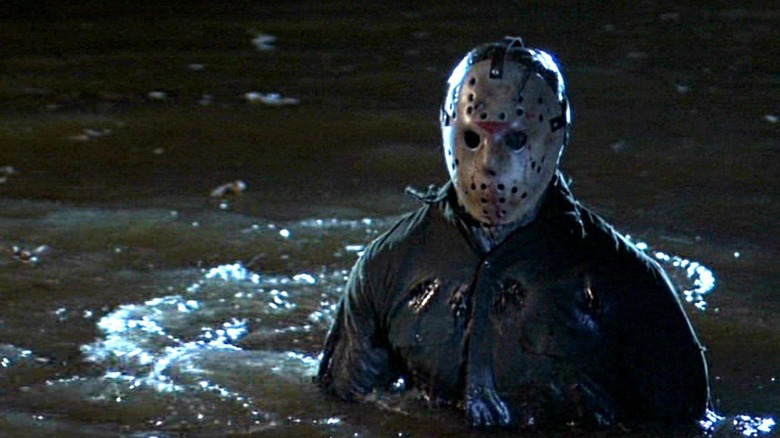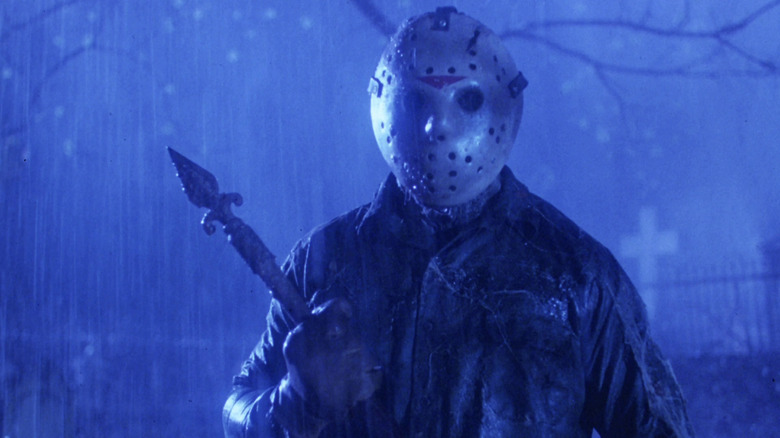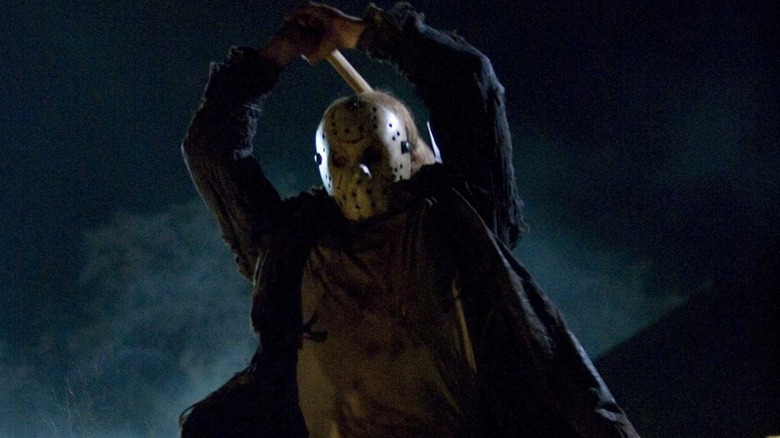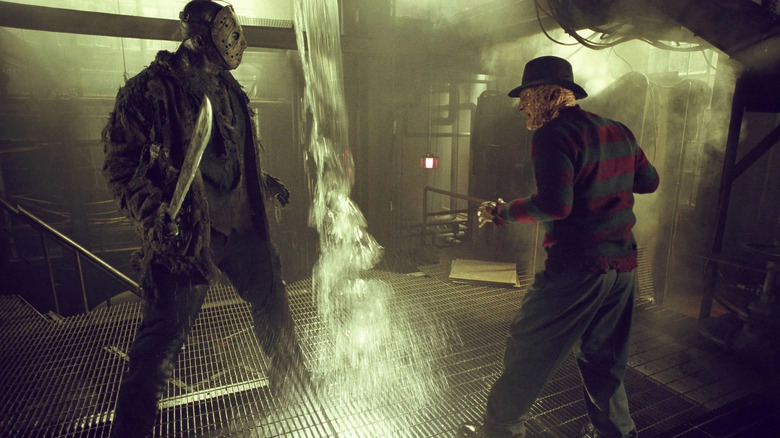Why Friday The 13th's Jason Voorhees Is The Greatest Horror Movie Slasher Of Them All
As of this writing, there have been 12 films in the long-running "Friday the 13th" series. Initially produced by Sean Cunningham, and featuring an undead, mute, masked killer named Jason Voorhees, the "Friday the 13th" movies once used to be as ubiquitous as the "Saw" films were in the early 2000s. From 1980 to 1989, audiences enjoyed pretty much one "Friday" every year ('83 and '87 went without). In the glut of hastily made sequels, one might forget how simple and perfect the original "Friday the 13th" concept was. The first movie was, by Cunninham's own admission, a mere knock-off of John Carpenter's 1978 film "Halloween," but the sequels soon became legitimate peers to their forebears, and came to define the slasher era in earnest (for better and for worse). Cunningham's admiration of "Halloween" can be found in David Grove's 2005 book "Making Friday the 13th: The Legend of Camp Blood."
One might argue that even the best "Friday the 13th" film isn't a great work of cinema, and one would be correct. One might also note that the "A Nightmare on Elm Street" series and the "Halloween" series are generally more creative and/or scarier than the bare-bones, pretense-free "Friday" flicks. But, in an odd way, the "Friday the 13th" movies came to be seen as the "baseline reading" for slasher movies. They never transcended, instead being content to feature simple ideas, blank-slate kill scenes, and meat-and-potatoes filmmaking. The mythology changed from film to film, and even Jason himself was played by 10 different actors in the 12 movies, but the consistently low quality came to be dependable and even appreciated. "Friday the 13th" sequels became as reliable as the tides.
And, importantly, they captured something that some readers may have experience with: the campfire ghost story.
Summer Camp history
Something to recall: most of the "Friday the 13th" movies take place in New Jersey. That's not an arbitrary location. Summer Camps as we know them today find their origins in the 1880s, and were constructed specifically as an antidote to the increasing bustle of urban life. Some parents felt their kids would benefit from a stint in the wilderness, learning crafting skills, survival skills, and generally appreciating the beauty of the natural world.
In 150 years, this thesis for Summer Camps hasn't changed, and many parents still sign their kids up for summer-long sojourns to lakes, to islands, to the mountains, to some remote place far away from urban centers. According to an article on the website JSTOR Daily, psychologists as early as 1904 argued that children developed better if they could experience an outdoorsy life and experience minor, primal survival challenges. By 1918, there were over 1,000 Sumer camps in the United States.
In the late 1970s, citizens of New York and other outlying metropoles looked to the woods of New Jersey as the site of their kids' summer-long overnight campgrounds. Kids would stay in cabins, form fast friendships, and live in a bubble world, sometimes for three full months. Naturally, the kids and counselors at these camps, being city-dwellers for most of the year, were thrilled by living in the woods and their imaginations inflamed. Hence, when the sun goes down, and everything is dark, friends would gather around the fire and tell tales of creatures and monsters living in the woods. It was on a night just like this that a camper just like you drowned in that lake, kiddies. His body was never found ...
Jason Voorhees was a campfire story, stemming from a very real New Jersey-specific experience.
The campfire story come alive
The "Friday the 13th" movies only feature a few actual campfire scenes — there's a notable one in "Friday the 13th Part 2" (1981) — and only one of them takes place at a Summer Camp that is up and running. This is not a series about Jason Voorhees stalking and killing little kids at a camp.
Instead, the "Friday the 13th" movies are an actualization of a campfire story being told by a 12-year-old camper.
Jason himself, after all, was a camp kid who was neglected by his counselors while they snuck off to have sex and drink. Jason drowned in Crystal Lake while unsupervised. He then returned from the grave to exact his revenge. If a 12-year-old camper wanted a spirit of vengeance to take care of counselors they may very well hate, Jason fits the bill. In a way, Jason is a meta-fiction. He is a story within a story. It was on a night just like this, counselors, that you screwed up so badly that a kid died. That kid is back and wants your blood.
Jason has been notably puritanical in his kills over his 12 movies, usually first murdering teens who most enthusiastically engage in vices like sex and drugs. Because of this some critics have cited Jason as a symbol of holy vengeance, a supernatural and puritanical defender of chastity and the Christian status quo.
More than that, though, I feel that Jason represents something more adolescent: Jason is manifested by a fearful kid, wary of the oncoming onslaught of puberty, lashing out against the older teens who have mutated into booze-thirst lust-bots. Jason, for all his bloodlust, is a defender of childhood. Perhaps that's why Jason generally doesn't kill people under 18.
The idiocy of mythmaking
Of course, the inconsistent in-script mythmaking in the "Friday the 13th" movies tells a different story. In the first "Friday," it was revealed that Jason did not come back from the dead, but instead that his mother Pamela (Betsy Palmer) was driven mad by seeing her son die in a lake, and took her own bloody revenge on the counselors. The twist allowed "Friday the 13th" to come across as a whodunnit. In the sequel, Jason was bafflingly back, having survived drowning and moving into a shack in the woods. Don't ask why his mother didn't know about him. Every so often, when Camp Crystal Lake prepped for opening, Jason would stalk out of the woods, find horny teens, and cut them up with whatever puncturing tool happened to be handiest.
Eventually, Jason became immortal, battled a Carrie stand-in, and fought Freddy Kreuger. In at least one sequel, Jason was a demon parasite that could leap from body to body. It didn't take long for the series to forget Jason's campfire story origins.
The sequels are largely terrible (Part 2 is a proud exception), but even without the campfire elements, they retained their power to entertain our lizard brains. Their staunch refusal to stick to a single mythology communicated little more than a studio's cynicism; these were movies put out by execs who just wanted to throw off quick, cheap gore flicks for an even quicker buck. The execs had just as much disregard for human life as Jason himself, throwing teenage meat into the gristmill in exchange for a few million bucks.
Horror fans accepted and appreciated this. We knew we were being exploited and we didn't care. There's a weird purity to kill-first cinema, and that's all we wanted.



